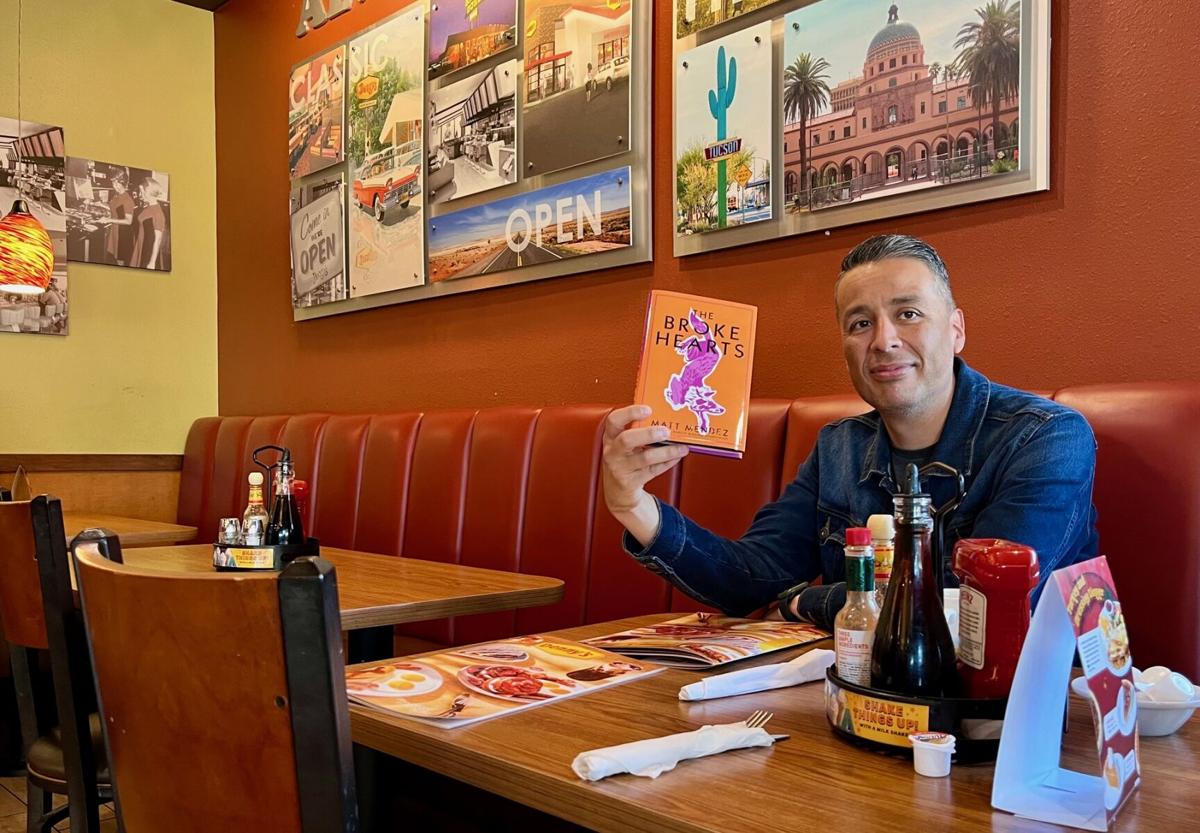To fully appreciate the life of a modern American author, to truly understand the glamorous world they live in, we take you today to the office of Tucson author Matt Mendez.
That’s it, there on the right. Behind the yellow sign that says “Denny’s.”
Welcome to the Denny’s Restaurant on East Valencia Road at South Tucson Boulevard near the airport … hardly La Rotonde, but an always-open hideaway for an emerging writer.
“For the better part of a year, this was my office,” Mendez recalled during a visit there last week. “I was going to school in the morning and working the swing shift at the Arizona Air National Guard. After I got off, at 11:30, I’d come over here. I had a regular booth. I’d order a plate of french fries and coffee, put on some big headphones to take away the noise, and write ‘til 1:30 or 1:45 … three or four nights a week.”
Say what you will about the ambience, it worked. From that booth at Denny’s, he wrote his first novel, “Barely Missing Everything,” which was published by Atheneum Simon and Schuster in 2019.
A sequel, “The Broke Hearts,” was released last month, and the book world has noticed.
Two weekends ago, Mendez appeared at the YALLfest in Charleston on Saturday and the Texas Book Festival in Austin on Sunday.
Landing at the Tucson airport late that Sunday night, he flashed back to all those late nights he spent right around the corner.
“I remember eavesdropping on some of the weirdest conversations,” Mendez laughed. “People who come to a Denny’s after midnight have some pretty amazing stories to tell. But I needed a place to write. When I go home, I want to be a husband and a dad. At Denny’s I could be a writer.”
Not only did Mendez find his voice, he found an audience.
“Barely Missing Everything” and “The Broke Hearts” are both written for young adults … young Hispanic males, in particular. The two books feature Danny and J.D., teenage friends learning to navigate the streets of El Paso and life beyond. For Mendez, who grew up on those streets, it was a case of “write what you know.”
There was a personal connection, as well. The original concept for “Everything” evolved from research Mendez had done for a short story. He had learned of a death row inmate from a small town in Texas who shared Mendez’s birthdate. The man was convicted on the day Mendez graduated from the University of Arizona. Mendez sent the man a letter, and they corresponded for a time.
“In the book, I wanted to explore how life experiences can send two similar people in totally different directions,” Mendez said. “I thought I was writing for adults. It was my agent who suggested it might be a story for young adults.”
The good news: He now knows the audience he is writing for. The bad news: he knows, from personal experience, a big part of that audience doesn’t read books.
Mendez grew up in a working-class neighborhood in El Paso, a self-confessed street kid. He was the loud boy in the back of the class, the one who would make jokes instead of trying to learn.
“My parents hoped I would get a good job after high school; we never talked about college,” he said. “Honestly, I didn’t even know what a lawyer or an accountant even did.”
He did know where the video store was. There, he found films that spoke to him far more than any of the books he had read.
“They had movies about people who looked like me,” he said. “There were stories that sounded like the places I knew. I loved those movies, loved ‘em. I started watching tons and tons of movies, and started to wonder if I could tell my own stories with a camera.”
His plan, initially, was to join the Air Force and use the G.I. Bill to underwrite film school. That’s what brought him to Tucson, but a funny thing happened on his way to becoming a filmmaker like Rodrigo Rodrigues. He decided to become an author such as Hernan Diaz, instead.
“I took some creative writing classes, thinking they would help me write scripts,” Mendez said. “Before long, people like Meg Files and Aurelie Sheehan had me reading books. I’d never been much of a reader before, but I found a treasure trove of books. ‘The House on Mango Street’ by Sandra Cisneros actually changed me as a person. The more I read, the more I felt like I did back in that video store — but now it was books.”
Today, Mendez wants to share that video-store, bookstore excitement with a new generation of young people.
There is an increasing number of books for Hispanic teens, and Mendez hopes his own contributions — written in their voice, with themes they’re familiar with — will find some homes.
“We need to find ways to get teen boys to read,” he said. “It will be a hard audience to crack. We have to compete with phones, video games, music, sports … Tough kids don’t hang out in the library. But if they could see themselves in books, it would help them figure out who they are. I know it did for me. It just took awhile.”
FOOTNOTES
Mendez is still with the Air National Guard, now a chief master sergeant overseeing the maintenance of 32 F-16s. His hours have changed, too. He wrote “The Broke Hearts” in his car … while his daughters were at Ballet Folklorico practice.
Tuesday, Nov. 28, is “Pub Day” for Tucson novelist Jillian Cantor … the official publication date for her newest book, “The Fiction Writer.” All of Cantor’s best work can be found on the historical fiction table, and this one involves a real-life plagiarism scandal that ensnared author Daphne du Maurier in 1938.





